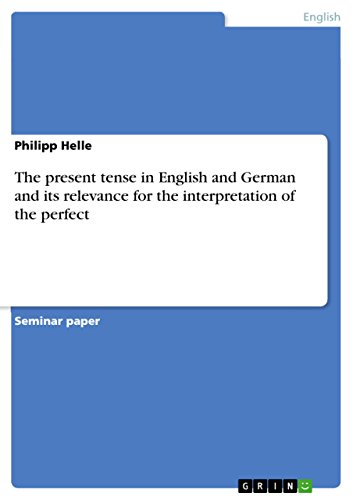The present tense in English and German and its relevance for the interpretation of the perfect - Softcover

Zu dieser ISBN ist aktuell kein Angebot verfügbar.
Alle Exemplare der Ausgabe mit dieser ISBN anzeigen:„Über diesen Titel“ kann sich auf eine andere Ausgabe dieses Titels beziehen.
- VerlagGRIN Verlag
- Erscheinungsdatum2009
- ISBN 10 3640301013
- ISBN 13 9783640301010
- EinbandTapa blanda
- Auflage4
- Anzahl der Seiten24
Neu kaufen
Mehr zu diesem Angebot erfahren
Versand:
EUR 32,99
Von Deutschland nach USA
Beste Suchergebnisse beim ZVAB
The present tense in English and German and its relevance for the interpretation of the perfect
Buchbeschreibung Taschenbuch. Zustand: Neu. Druck auf Anfrage Neuware - Printed after ordering - Seminar paper from the year 2005 in the subject English Language and Literature Studies - Linguistics, grade: 2, University of Hamburg, course: Tense, Aspect and Modality, language: English, abstract: In their analysis of the perfect in English and German Klein and Vater postulate that the English present perfect and the German Perfekt are very much the same except that the Perfekt has two additional usages. They refer to Anderson (Anderson, 1982:228) and list five major usages of perfect in the English language to which exist corresponding usages in the German Perfekt and give the following examples - the example for the present continuous is left out because it does not concern the analysis given in this paper:1.ExperientialHave you ever been to Japan Sind sie je in Japan gewesen 2.Current relevance of anteriorHe has studied the whole book. (So he can help.)Paul hat sich mit Biologie befasst. (Paul kennt sich damit aus.)3.New situation, 'hot news'The Etna has just erupted!Eben hat es geblitzt!4.Result-stateHe has gone. (or) He is gone. (is not here)Er ist weggegangen. (Er ist weg.)The two additional functions they see are that the Perfekt can easily relate to the future and often functions like the English simple past as can be shown by the following examples:1. The Colossus of Rhodos weighed 100 tons.Der Koloss von Rhodos hat 100 Tonnen gewogen2. Tomorrow at ten, Peter will have left London.Morgen um zehn hat Peter London verlassen.In their proceeding they postulate that the tense systems of English and German do not mainly differ with respect to the perfect but that the role of the present tense is to blame for the observation made in the beginning. They base this conclusion on an excerpt from Comrie who wrote about the compositional structure of the perfect - being a composite of a present tense auxiliary and a past participle - that 'the present auxiliary conveys the present meaning, while the past participle conveys that of past action' (Comrie, 1976:107).Klein and Vater's assumption is that in the English language the present tense is closely bound to the moment of speech whereas in German it is relatively free in this regard (Klein/Vater, 1998:221). This led to a lively discussion in the course with two main points. The first being whether it is justified to state that English and German differ crucially in their usage of the present tense, and the second, assuming this difference really exists, whether it is the reason for the additional functions of the Perfekt. Artikel-Nr. 9783640301010
Weitere Informationen zu diesem Verkäufer | Verkäufer kontaktieren

